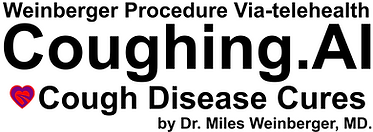Paradigm Shift in Modern Medicine ~ Habit Cough: A Pseudo-asthma Syndrome
- Dennis Buettner
- Dec 30, 2022
- 3 min read
Updated: Jun 22, 2023
If you have had questions about your child's, or your chronic cough; please read the peer reviewed and published papers below. This brilliant editorial by Dr. Miles Weinberger, MD, was requested from the esteemed editor of the Indian Journal of Medical Research. Dr. Weinberger is the world's most renowned asthma researcher, He founded and ran the asthma and cough center at the University of Iowa for 40+ years. He has been researching, and discerning the difference between asthma and habit cough for decades. His diagnosis is quite simple.
Habit Cough Diagnosis in Adults and Children by Dr. Miles Weinberger, MD. Updated to include "acute" cough (below) by Dr. Weinberger on March 19, 2020
The repetitive [daytime] barking cough that is not present once the patient is asleep is the diagnostic criteria. (It might take a while for the patient to fall asleep. It matters whether the cough is not present once asleep; only to return once awake. - Editor note.)
The characteristics of the self-perpetuating [daytime] Habit Cough is its repetitiveness and absence once asleep.
Once the patient meets the diagnostic criteria for [daytime] Habit Cough, even while the repetitive cough is still considered acute (less than 4 weeks), treatment with suggestion therapy [Dr. Weinberger's Procedure HERE; in-office, via-telemedicine and by-proxy] is appropriate. There is no need to wait until the [daytime] cough is considered to be chronic (4 weeks/ child & 8 weeks/adult)
Multiple patients report that knowledge of Dr. Weinberger's Procedure allows them to stop their future [daytime] coughs during the acute period once diagnosis of Habit Cough has been met.
Note: Dr. Weinberger is a big proponent of patient interaction with their doctors. Many adults and parents report that they have quite successfully utilized The Weinberger Procedure on themselves or their children with numerous instant cures in the first days of their new acute [daytime] coughs - long before they become "chronic" in length. They report their cures to their amazed doctors. Please consult with your doctor prior to your use of Dr. Weinberger's Procedure. If you attempt to utilize The Weinberger Procedure on yourself or your child, you are doing this under your own volition.
The cough associated with asthma and that of habit cough syndrome might seem to be similar. They are not! (as noted in the first paragraph) Habit cough can be cured (in children and adults) without medication. HERE
From Dr. Weinberger's editorial above: "Chronic cough is commonly attributed to asthma. The habit cough is a functional disorder, often treated as asthma. However, there are differences that should be recognized. Cough from asthma will be stopped with a short course of oral corticosteroid, however, habit cough responds to no pharmacologic agents. The persistent coughing, without an identifiable cause, that is the characteristic of this disorder troubles the patient, family and physicians whose diagnosis and treatment are sought. The morbidity of this disorder is increased by unsuccessful medical interventions consisting of diagnostic procedures and therapeutic trials for other causes of cough.
History The known history of the habit cough begins in the 17th century. A book in the year 1694 by Franciscus Mercurios (1614-1699), a Flemish physician, alchemist, kabbalist and writer, published as a book, The Spirit of Diseases or Diseases from the Spirit Laid Open in Some Observations Concerning Man and His Diseases. It included a broad range of topics. However, the one of interest for the subject of this commentary reads as follows: ‘…Habitual Cough, which often continues after the first cough, which was caused by the cold, is gone …. and the Habitual Cough often proceed’2. A medical textbook from 1685 by Thomas Willis (1621–1675) described an adult woman with ‘a violent dry cough following her day and night unless she was fallen asleep’, a description that would fit the habit cough diagnosis today. Habit cough was also recognized in the 19th century in the writing of Charles Creighton (1847-1927), a British physician and medical author who was highly regarded for his scholarly writings on medical history. In his 1886 book, Illustrations of Unconscious Memory in Disease, he described, ‘…a habit cough – a reflex effect persisting after the cause is gone …. or an acquired habit….’ He went on to state, ‘…the treatment of it is to break the habit ….’
Read the complete manuscripts linked below; print them out and show them to your trusted doctors. They might certainly know Dr. Miles Weinberger, MD, from University of Iowa.
Not medical advice. Consult with; and trust YOUR doctors.





Comments